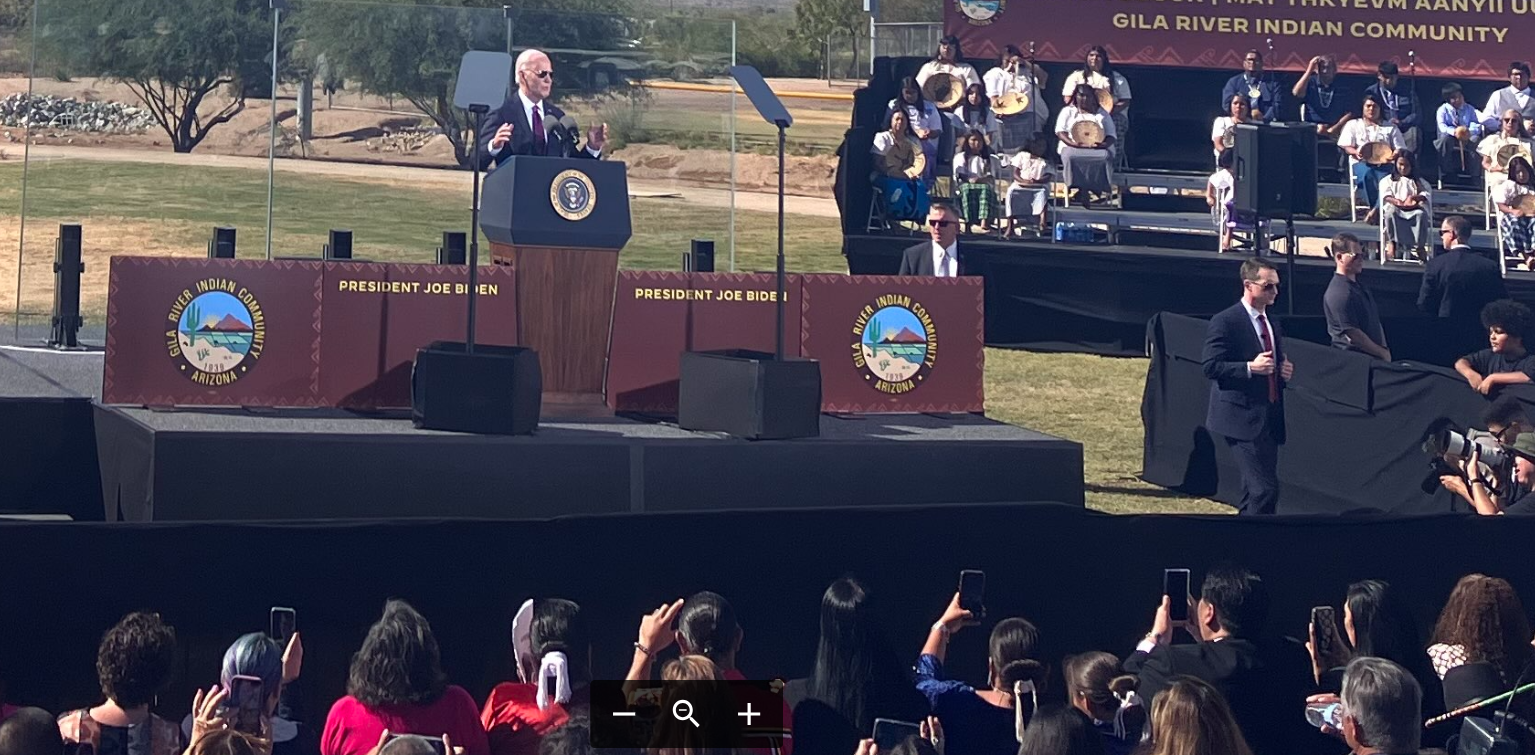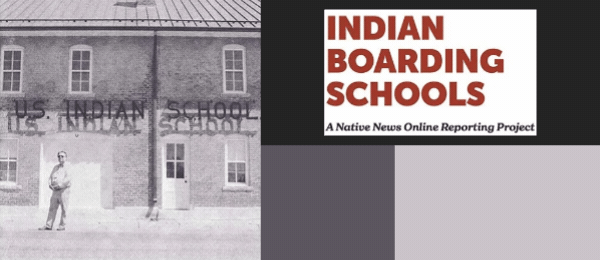
- Details
- By Shaun Griswold
GILA RIVER INDIAN RESERVATION -- A moment of silence, and then an apology.
President Joe Biden marked history at the Gila River Indian Community where he apologized before community members and tribal leaders from nations across the country in an effort to move forward from the horrendous era of the U.S. Indian boarding school policies.
“Native communities flourished on this land, they practiced democratic government before we ever heard of it, developed advanced agriculture, contributed to science, art and culture,” Biden said to a round of cheers.
This marked the first visit by a U.S. president to a tribal nation since Barack Obama went to Standing Rock in 2014.
“Tens of thousands of Native children entered the system, nearly 1000 documented Native child deaths, though the real number is likely to be much, much higher,” Biden said.” Lost generations, culture and language, lost trust. It's horribly, horribly wrong, it’s a sin on our soul.”
At this point he asked the crowd from a podium set up on a football field at the Gila Crossing Community School, where Native kids from kindergarten to 8th grade now learn their traditional languages and songs, for a moment of silence to honor the people harmed by the federal boarding school system.
Then, Biden made a remark that has never been said by a U.S. President.
“The federal government has never, never formally apologized for what happened, until today, I formally apologize,” he said. “It's long, long, long overdue. Quite frankly, there's no excuse this apology took 50 years to make. The federal Indian Boarding School policy and pain it has caused will always be a significant mark of shame, a blot on American history.”
Cheers followed. So did tears from many in the crowd that were emotional even before Biden’s remarks.
Interior Secretary Deb Haaland, whose department commissioned a truth and reconciliation report that investigated this history and outlined a course of action, spoke before the President, tearing up at one point before delivering a powerful line that rushed enthusiasm in the crowd.
"The federal government took deliberate and strategic actions through boarding school policies to isolate children from their families and steal from them the languages, cultures and traditions that are foundational to Native people,” she said. “But as we stand here together, my friends and relatives, we know that the federal government failed.”
Haaland said that the research from the Interior into the boarding school era will continue to develop with historical markers that include potential monuments and oral history projects. She said traditional language revitalization programs will grow out of this research, signaling that a project led by language experts and teachers will be rolled out soon.
“For much of this country, boarding schools are places where affluent families send their children for an exclusive education for indigenous peoples, they served as places of trauma and terror,” Haaland told the crowd. “For decades this terrible chapter was hidden from our history books, but now our administration's work will ensure that no one will ever forget.”
Native people from Gila and beyond that were in the crowd said that the apology is a good step to moving forward, and that what is ever next should also include much more support for cultural practices that remain and, seemingly, are growing.
At the event, dozens of children from Gila River, Ak-Chin and Tohono O’odham sang traditional songs and prayers before Biden’s appearance.
Joshua Francisco watched his aunts, sisters and nieces perform before the president’s visit. He tapped his cane to the rhythm from the rattles from the singers they danced too. In four years he wants to see the United States keep the promises it’s making on how to heal from the boarding school atrocities, and continue to boost access to water and energy independence.
“Just let us thrive. A lot of governments keep us Native Americans down like that, but we're still here. We don't give up like that,” he said. “We're showing it right now that we're still here with our tradition. They haven't killed our tradition yet, and hopefully you don't.”
David Vandruff is from Gila River where he works to support health programs from community members. He helps with a healthy foods garden program at the Gila school where Biden apologized. Vandruff said the garden is planting root vegetables like broccoli, radishes and onions.
“When students learn about the history of our people and how we used to garden and farm along the river, it helps them understand their place in the world,” Vandruff said.
He said the harm that is caused by poor diets and a lack of access to healthy foods can be addressed in schools and should be part of any programs target to fix harms caused to Native people in educational settings.
“Kids are growing up in the non Indigenous world. And so there is a a time and place in a young person's life where they have what I refer to as an identity crisis, and so something like gardening and farming can help them bridge that gap or come back to their roots.”
That history of Native people, or what was done to Native Americans at boarding schools that shifted their trajectory in a horrendous way was front and center for Virginia Flores.
Flores is Diné and went to a boarding school in Arizona. Her experience was consistent with the terrible accounts seen in the report from the Interior department.
“I spent eight years of my life at the Shonto Boarding School. It was rough, the abuse, the sexual abuse. The things we were exposed to, it was rough,” she said.
Flores works in child welfare with Native American kids. It’s what she’s done in life to heal. For her she wants to see the traditional language revitalization investment grow. It’s something she started with her kids that are now adults. Practicing language together is an act of care and one that is an act of stopping generational trauma.
Native Americans traumatized at boarding schools took that back home and passed down those harms to their family. Flores said her parents left the school without any idea on how to show care or even discipline without violence.
“Just that affection you give to a kid, it was really hard,” she said.
So she found that affection working on learning basic Diné with her daughter, who is now studying it more in college. “She always says, ‘Mom, you know what? You should have taught me how to speak my own language. Now I have to pay to go to the university to learn my own language.’”
“I think our younger kids need to do their Native languages and things like that in school,” she said, “Even at home, you know, it's like just teaching.”
More Stories Like This
Native News Weekly (August 25, 2024): D.C. BriefsUS Presidents in Their Own Words Concerning American Indians
Native News Online Marks 15 Years of Warrior Journalism
I’m a Minneapolis Postal Worker. This Is What I Saw.
Next on Native Bidaské: Inside Dark Winds with the Cast of Season 4
Help us defend tribal sovereignty.
At Native News Online, our mission is rooted in telling the stories that strengthen sovereignty and uplift Indigenous voices — not just at year’s end, but every single day.
Because of your generosity last year, we were able to keep our reporters on the ground in tribal communities, at national gatherings and in the halls of Congress — covering the issues that matter most to Indian Country: sovereignty, culture, education, health and economic opportunity.
That support sustained us through a tough year in 2025. Now, as we look to the year ahead, we need your help right now to ensure warrior journalism remains strong — reporting that defends tribal sovereignty, amplifies Native truth, and holds power accountable.
 The stakes couldn't be higher. Your support keeps Native voices heard, Native stories told and Native sovereignty defended.
The stakes couldn't be higher. Your support keeps Native voices heard, Native stories told and Native sovereignty defended.
Stand with Warrior Journalism today.
Levi Rickert (Potawatomi), Editor & Publisher


